#by prokofiev
Explore tagged Tumblr posts
Text
Regardless of your views on weddings and marriage as institute, reblog this and put in the tags what track would you choose for your wedding dance.
0 notes
Text

Some Random Composer Doodles
#franz liszt#frederic chopin#felix mendelssohn#hector berlioz#ludwig van beethoven#pablo de sarasate#pyotr tchaikovsky#dmitri shostakovich#sergei prokofiev#wolfgang amadeus mozart#antonio salieri#classical composer#classic composers#classical composer fanart#art
85 notes
·
View notes
Text
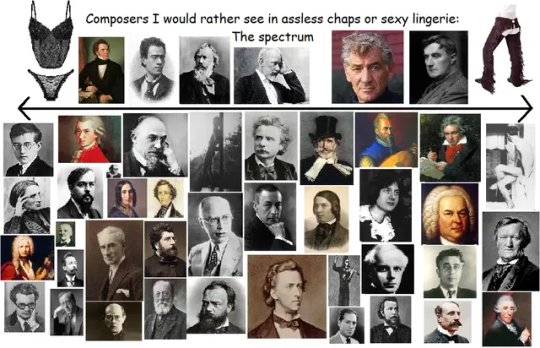
I made this a while ago on paint at midnight in a fever like state and needed to post it here
#classical music#classical composer#composer memes#classical memes#benjamin britten#shostakovich#johann sebastian bach#schubert#clara schumann#robert schumann#gustav mahler#johannes brahms#stravinsky#prokofiev#vivaldi#saint saëns#tchaikovsky#rachmaninoff#beethoven#lili boulanger#chopin#bartok#richard wagner#franz liszt#mozart#claude debussy#mendelssohn#joseph haydn#maurice ravel#leonard bernstein
481 notes
·
View notes
Text


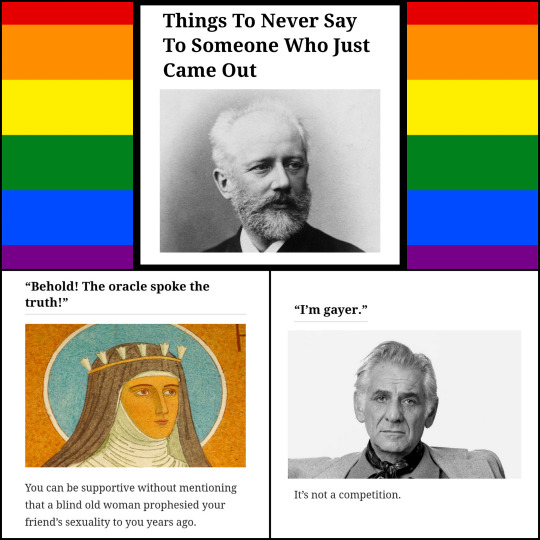


Things To Never Say To Someone Who Just Came Out - Composers Edition!
#tchaikovsky#hildegard von bingen#bernstein#brahms#britten#haydn#prokofiev#ravel#rachmaninoff#robert schumann#clara schumann#messiaen#chopin#mozart#stravinsky#debussy#lully#berlioz#wagner#charles ives#classical music#classical music memes#music memes#composer memes#lgbt#gay#lgbt history#gay history#the onion
496 notes
·
View notes
Text
everyone shut up this is ACTUALLY what fans of different composers are like
Mahlerians are PROUD TO BE ABSOLUTELY INSUFFERABLE DRAMA QUEENS, THE LIKES OF WHICH EVEN THE WAGNER CULT COULD NEVER SO MUCH AS ASPIRE TO BE. WE ARE ONE WITH THE UNYIELDING EBB AND FLOW OF THE BOUNDLESS UNIVERSE, DAMN IT ALL!
Shostakovich fans are like Mahler fans except they actually understand what sarcasm is. We also all really like the Muppets for some reason. Most of us own cats and likely have at least one mental illness.
Liszt fans are either tweenagers who love anime or salty old pianists who know a disturbing amount about music theory. These two factions are constantly at war.
Copland fans are either very, very far right or very, very far left. Either way, neither side actually listens to all of Copland's repertoire.
Tchaikovsky fans are either Russian grandmas or LGBT orchestra kids on Tiktok. Either those or the one noob who heard there were cannons once.
Wagner fans. Yes, there are the cringey neo-Nazi Wagnerians, but anti-Nazi Wagnerians are a whole new level of chaotic good. They spend their time dreaming up the most disastrous, chaotic Ring productions possible, with the sole purpose of making Richard Wagner's entire family simultaneously spin in their graves. They take "death of the author" to a whole new level and constantly run on nothing but 100% pure spite. You want a Wagnerian who would beat up Wagner in a Denny's parking lot on your side.
Prokofiev fans will unironically say "ackshually...". That's it.
Dvorak fans are homeschool kids. They're either soul-crushingly innocent or devastatingly horny.
Sousa fans are just high school band directors who try to convince themselves they like Sousa to get through the semester.
Joplin fans constantly argue over whether Joplin's music should be played twice as quickly or twice as slowly than it's actually written. Also sick of hearing about Janis.
Chopin fans are exactly like Liszt fans, except there are 20% more "uwu softboi flowercrown" edits of Chopin than Liszt floating around on Instagram and Tumblr.
Holst fans will drag you into an alleyway and beat you up with their bare hands if you so much as mention The Planets.
Bernstein fans are either horny theatre kids or communists, but it's more likely they're both at once. They are very opinionated about recordings, and express their approval of the ones they like by gyrating excessively to them. If you put a Bernstein fan, a Mahler fan, and a Shostakovich fan in one room, they will either topple a national government or have a threesome.
Ravel fans are inherently Wes Anderson fans. You can be friends with one for years without knowing a single thing about their personality.
Schoenberg fans are like Mahlerians but with worse memes.
Brahms fans are... I have never met a Brahms fan. I'm sure they exist, but I'm pretty sure my own taste in music scares them off.
Paganini fans are almost always TwoSet kids, particularly the ones who try to convince people that "classical music isn't boring because it's basically metal." If you tell them Paganini played viola, they will spontaneously combust.
Rachmaninov fans are ultimately really chill, but are often socially awkward. If you ask a Rachmaninov fan "how are you?", they will most likely respond with "you too."
Schumann fans are Mahlerians on medication.
Stravinsky fans think they're chaotic and unhinged and listen to the most obscure underground shit, but in all actuality they just decided to enter their edgy phase after a lifetime of being sheltered and forced to listen to nothing but Handel by their parents. Possibly homeschooled.
Ysaye fans are like Paganini fans, except they're depressed graduate music students with permanent calluses on their fingers.
Debussy fans go to art school, decide they don't like art school, but have been doing art school too long to turn back, so they can't get out of art school. They may be high on weed at any given moment.
Satie fans are just possessed vessels of Erik Satie. Death cannot hinder Erik Satie. Erik Satie will return to this mortal plane. Search your feelings. You are already Erik Satie.
#classical music#music#composer#composers#mahler#shostakovich#iszt#copland#tchaikovsky#richard wagner#prokofiev#dvorak#sousa#scott joplin#chopin#ysaye#schumann#stravinsky#debussy#satie
746 notes
·
View notes
Text
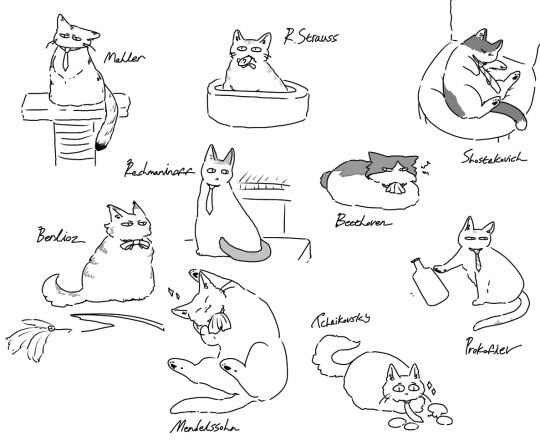
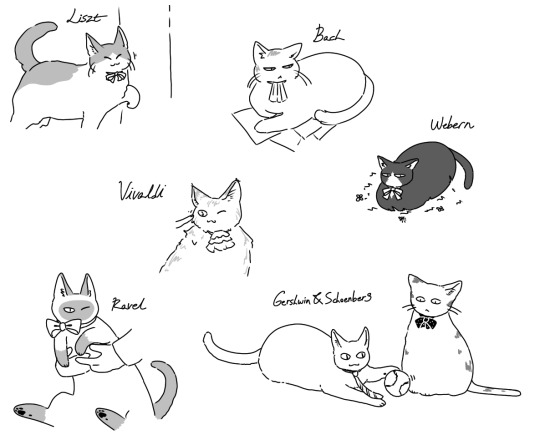
Catpawsers
#classical composers#gustav mahler#richard strauss#dmitri shostakovich#hector berlioz#sergei rachmaninoff#ludwig van beethoven#sergei prokofiev#felix mendelssohn#pyotr ilyich tchaikovsky#franz liszt#johann sebastian bach#antonio vivaldi#anton webern#maurice ravel#george gershwin#arnold schoenberg
151 notes
·
View notes
Text
Natasha and Pierre throughout several adaptations of War and Peace
[BBC War and Peace (Harper, 2016), War and Peace (Bondarchuk, 1965-1967), War and Peace (Prokofiev), BBC War and Peace (Conroy, 1972), War and Peace (Vidor, 1956), War and Peace (Dornhelm, 2007), Natasha, Pierre & the Great Comet of 1812 (Malloy)]
#war and peace#natasha rostova#pierre bezukhov#lev nikolayeviç tolstoy#natasha pierre and the great comet of 1812#prokofiev#bbc war and peace#audrey hepburn#lily james#sergei bondarchuk#paul dano#soviet film
102 notes
·
View notes
Text
I was listening to a classical German version of Peter and the Wolf / S. Prokofiev while working. Now I was looking for something else and somehow stumbled upon an
- ENGLISH VERSION
- A JAZZ ADAPTION
- NARRATED BY DAVID TENNANT!!
It's great!
Here: Peter and the Wolf and Jazz with David Tennant

#David Tennant#Peter und der Wolf#Peter and the Wolf#sergei prokofiev#jazz#narrated by David Tennant#music#classical music
41 notes
·
View notes
Text

"You only listen to ballet music"
#classic academia#classical music#sergei prokofiev#dmitri shostakovitch#componist#beethoven#tumblr girls#girl group#girlhood#girl interrupted#manic pixie dream girl#coquette girl#gaslight gatekeep girlboss#girl interrupted syndrome#girl interupted syndrome#girl rotting#girlblog#girlblogging#hell is a teenage girl#im just a girl#just girly posts#dead poets society#just girly thoughts#just girly things#pinterest girl#girblogger#i'm the sweetest girl in town so why are you so mean?#this is what makes us girlbloggers#this is what makes us girls#sleep to dream
26 notes
·
View notes
Text
24 notes
·
View notes
Text
You're talking about jealousy? I'll tell you about jealousy. Rachmaninoff knew Tchaikovsky, Tolstoj, Prokof'ev, Stravinsky and Arenskij.
#Also he was himself which is already enviable as it is#rachmaninoff#rachmaninov#tchaikovsky#lev tolstoj#leo tolstoy#sergei prokofiev#stravinsky#arenskij
32 notes
·
View notes
Text
this isn’t ironic anymore, isn’t it.

#art#digital art#ibispaintx#phone art#csm fanart#chainsaw man#asa mitaka#asa chainsaw man#asa csm#asayoru#yoru csm#yoru chainsawman#I listening to Prokofiev’s Romeo and Juliet while drawing this#BOOM#KABOOM#THE VOICE INSIDE MY HEAD IS TRYING TO RIZZ ME UP#probably asa#They’re very venom and Eddie coded right#Yoru would try to flirt with reze because. Bomb devil.#I might draw that or draw AsaReze#Pick your side ig
54 notes
·
View notes
Text

Seryozha i Mitya🍷🚬
#sergei prokofiev#dmitri shostakovich#classical composer#classic composers#classical composer fanart#art
56 notes
·
View notes
Text
battle of the sevens 🥊7️⃣💢
#thought this might be funny hehe#you already know im going to bat for mahler 7#MANDOLIN GUITAR AND COWBELL WHAT MORE DO YOU NEED ‼️‼️‼️#mahler#classical music#beethoven#dvorak#bruckner#Prokofiev#maslanka#shostakovich#all that said i think that of these shostakovich 7 is probably going to win#number polls
41 notes
·
View notes
Text


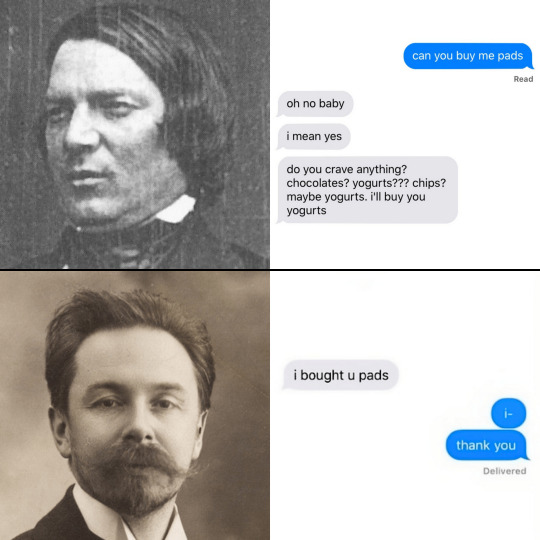
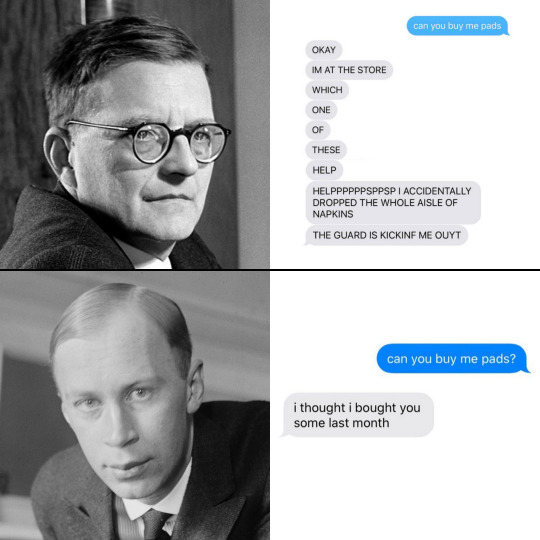

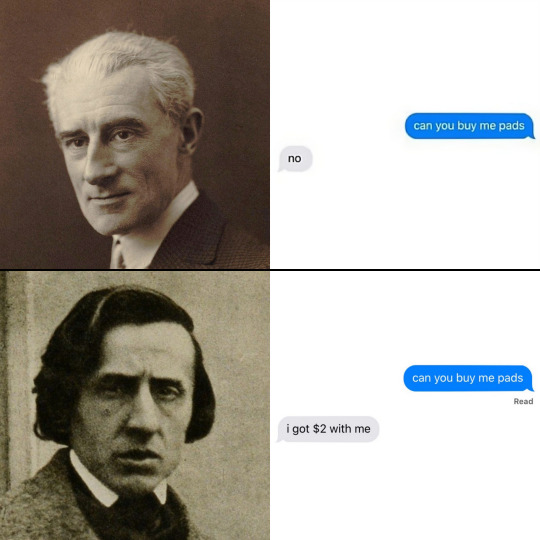
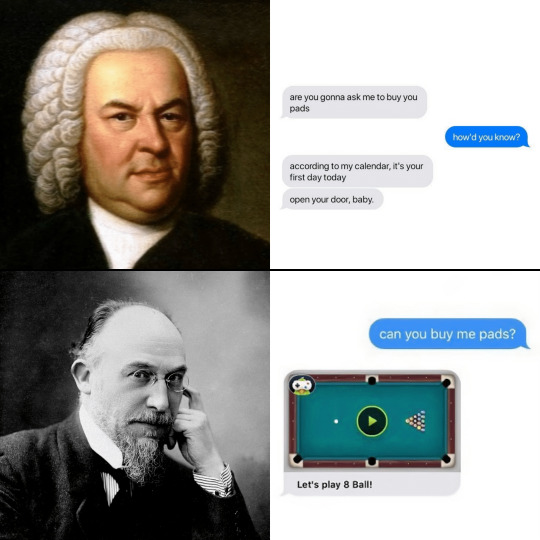

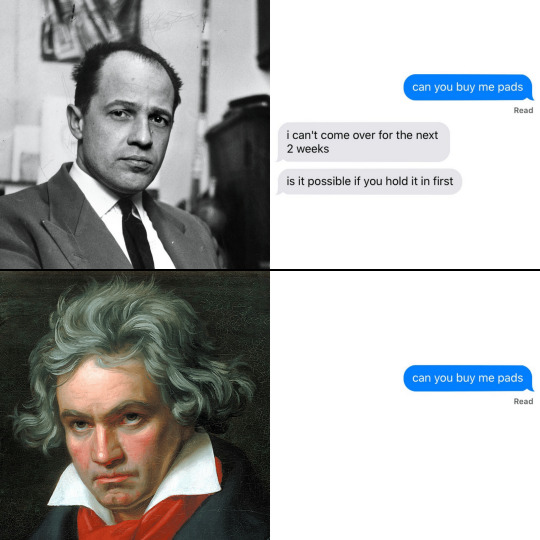

#berlioz#liszt#haydn#mahler#schumann#scriabin#rachmaninoff#mussorgsky#mozart#messiaen#ravel#chopin#bach#satie#boulez#beethoven#shostakovich#prokofiev#classical music#classical#classical composers#composers#classical music memes#can you buy me pads#memes
688 notes
·
View notes
Text
Dmitri Shostakovich at Sergei Prokofiev's funeral, 1953.

For context, Prokofiev and Stalin died on the same day- March 5, 1953. Because Stalin's funeral was such a major event in the Soviet Union, Prokofiev's was largely overlooked, despite the fact he was one of the leading Soviet composers of his day. Relatively few people attended his funeral, Shostakovich among them.
Shostakovich and Prokofiev were not particularly close, and had a thorny professional relationship- much of the correspondence between them that I've been able to find appears to be formal criticism of each other's works. As Prokofiev was from an older generation- he was born in 1891, while Shostakovich was born in 1906- they did not always see eye-to-eye musically; Shostakovich experimented with the avant-garde when possible, perhaps in part due to his musical maturation during the socially-liberal NEP era, while Prokofiev's style tended to be more conservative and neoclassical- picking up more influence from Imperial-age composers and fellow emigres to the west (he lived in France and the United States before returning to the Soviet Union in 1936). Their generational difference also partially accounted for how they responded to harsh government criticism- Shostakovich was impacted by the consequences of his 1936 denunciation all his life and, while he suffered greatly during his second denunciation in 1948, was able to develop public and private personas, in both the musical and ideological spheres, to preserve himself and his artistry. However devastating as it was for Shostakovich, the 1948 denunciations took a greater toll on many other composers, Prokofiev included. As Prokofiev did not believe he would be harshly denounced as Shostakovich had been in 1936, he was far less prepared for the censorship and attacks he faced in 1948. As a result of the denunciations, combined with his declining health, his artistic productivity decreased, and he largely regulated himself to writing basic ideological works towards the end of his life.
This is a letter Shostakovich wrote to Prokofiev on the subject of his Seventh (and last) Symphony:
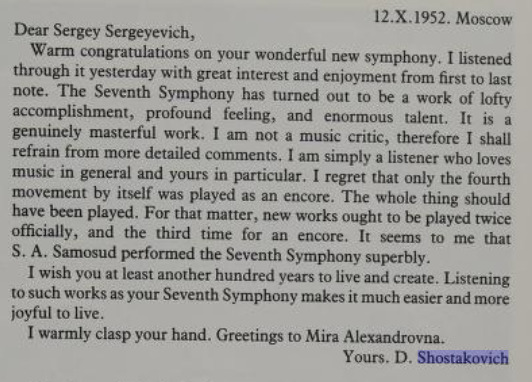
There's speculation as to whether or not Shostakovich was actually impressed by Prokofiev's Seventh Symphony. As Prokofiev was in decline at the time of writing it, the symphony has been criticized for being banal and not being particularly innovative; Rostropovich even claimed that Prokofiev added in its final flourish not for artistic purposes, but to have the piece nominated for a Stalin Prize, which would have meant money and a boost to his reputation after it suffered in 1948. (The Stalin Prize has its own complicated history in its role in Soviet music, and although it was the highest award a Soviet composer could earn, it could sometimes be awarded as a sort of backhanded punishment- an encouragement for composers to write the "right" sort of music, especially after they had been criticized for "formalism." Nonetheless, winning it after suffering a denunciation could mean financial and political security.) Did Shostakovich- who had often traded criticisms with Prokofiev over music- actually like this piece, or was this an effort to encourage a fellow artist to keep composing after suffering mental and physical ailments? This was a private letter and not a public statement, and Shostakovich was typically very straightforward about critiques, so if the entirely positive sentiment for the piece wasn't genuine (the only critique here is that Shostakovich says he wishes the entire symphony was encored!), the letter may have come from a place of concern.
Perhaps the most striking thing about this letter is the line, "I wish you another hundred years to live and create. Listening to such works as your Seventh Symphony makes it much easier and more joyful to live." Maybe by telling Prokofiev that he wished him another hundred years to live and create, Shostakovich was not simply praising the symphony, but encouraging Prokofiev- a composer whom he was often on icy terms with- that he needed to keep living and creating, during a time when it was becoming more and more difficult for him to do so.
#shostakovich#dmitri shostakovich#prokofiev#sergei prokofiev#music history#composers#classical composers#history#soviet history#classical music#music#cw dead body
317 notes
·
View notes